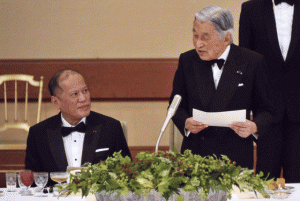TOKYO: Japan’s Emperor Akihito has told Philippine President Benigno Aquino 3rd his country feels “remorse” for its actions during World War II, in what one commentator said was a prod to nationalist Prime Minister Shinzo Abe.
Akihito’s role is narrowly defined and he is expected to stay above the fray, so any remarks he makes that stray into the political -- however obliquely -- are parsed for possible meaning.
In a speech welcoming Aquino to a palace banquet late Wednesday, Akihito noted there were active ties between Tokyo and Manila by the beginning of the 20th century.
“During World War II, however, fierce battles between Japan and the United States took place on Philippine soil, resulting in the loss of many Filipino lives.
“This is something we Japanese must long remember with a profound sense of remorse,” he said, according to the official English translation provided by the Imperial Household Agency.
“In particular, in this year of the 70th anniversary of the end of World War II, I offer my deepest condolences to all those who lost their lives then,” the emperor said.
His remark comes as Abe prepares a statement he is expected to deliver in August, which is being closely watched for any sign of what critics say is backsliding on previous Japanese apologies.
Abe’s predecessors offered apologies for colonial rule and aggression on the 50th and 60th anniversaries, but he has hinted he is unlikely to repeat that, saying instead he wants to issue a “forward-looking” statement.
That sentiment has caused disquiet among Japanese liberals and anger in Beijing and Seoul, which insist Tokyo needs to say sorry for its war history.
Akira Hashimoto, a veteran journalist on royal matters and a former schoolmate of the emperor, said Aquino’s visit had given the nominal head of state “an opportunity to express his opinion” that Japan should squarely admit its past wrongdoing.
The emperor “is striving to have the message heard,” Hashimoto noted.
“I believe his Majesty wanted Prime Minister Abe, rather than the Japanese people or people in other countries, to hear,” he told Agence France-Presse.
The mass-selling Yomiuri Shimbun also noted that Wednesday’s palace banquet was the third for Philippine guests since Akihito ascended to the throne, but was the first at which he had touched on the human cost of the conflict there.
The emperor “has always recognized Japan took wrongful actions during [World War II] and has felt deep remorse over the tragedies it brought about... His view has never wavered,” the pundit said.
Time to invest
The President also on Thursday encouraged Japanese investors to do business in the Philippines, citing the country’s improved business climate and the strength of the Filipino workforce.
In a speech before the Philippine Investment Forum in Japan, he described the country’s current status as a “far cry” from the country’s standing when his predecessor, Gloria Macapagal-Arroyo, left office.
“While the Philippines of today is a far cry from the Philippines of five years ago, there remains much to be done. There are other paths we can pave toward even greater progress, which is precisely why we are here,” Aquino told Japanese investors.
“Japanese companies have already made their mark on the Philippine electronics, shipbuilding, and automotive industries, among others, to the point where their work and their products are already irreplaceable in the lives of Filipinos. Today, I tell you, there is no better time to set up shop in the country,” he said.
According to Aquino, reforms initiated by his administration have resulted in a favorable business climate in the Philippines.
“We have leveled the playing field, improved the quality of infrastructure and vastly minimized corruption in doing business,” he said.
The President cited the country’s selling points, including its average 6.3 percent average GDP growth, credit ratings upgrade and the quality of the Filipino workforce.
“No doubt, this is due both to increased global demand and to the quality of our workforce. Filipinos are young, trainable, and skilled, companies have entrusted them with producing quality products, from luxury bags, to electronics and automobiles, to the components of modern aircraft,” Aquino said.
He also noted the Philippines’ acceptance into the European Union’s Generalized System of Preferences Plus (GSP+) that allows exporters to the EU to enjoy duty-free access for certain products.
“The Philippines as an investment destination is more attractive today than at any other point in our history. We can further deepen, or forge partnerships in which all parties benefit,” Aquino said.
The President is on the third day of his four-day state visit to Japan.
Also in his speech, Aquino cited how the Philippines adopted the Japanese philosophy of kaizen, or an aspiration of “continuous improvement” or “change for the better.”
“Though my administration may not necessarily have been familiar with the term at first, we have been practicing our own version of kaizen these past four years and eleven months. Among our goals was for our country to become a strong and competitive player in the global economy,” he said.
The President acknowledged Japan’s “role in securing the economic success,” being consistenly among Philippines’ leading trading partners.
Japan was the Philippines’ top trading partner in 2014 with total trade reaching $19.1 billion last year. It was also the top source of IPA- or Investment Promotion Agency-approved investments with total investments worth $0.8 billion in 2014.
“Allow me to once again express our deep appreciation to Japan for staying the course, for even with the economic difficulties prevalent in many parts of the globe, you have consistently been among the top sources of approved investments into the Philippines,” Aquino said.


